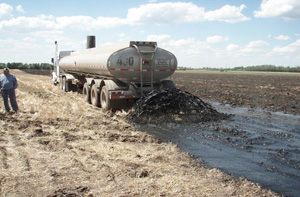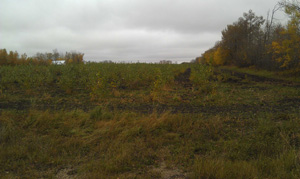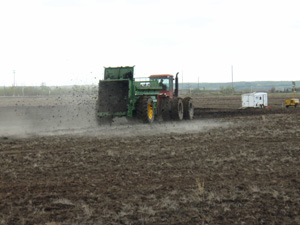EPCOR and Biosolids
Biosolids Have a Great Application in the Community
 It’s hard to believe that when you pull the plug on the tub or flush the toilet you are giving back to the community, but this is the case for more than a million residents in our capital region.
It’s hard to believe that when you pull the plug on the tub or flush the toilet you are giving back to the community, but this is the case for more than a million residents in our capital region.
Like many municipalities around the world, EPCOR and the City of Edmonton are making the most of the by-products from domestic wastewater treatment known as ‘biosolids’.
Comprised of water, organic and inorganic matter, there is much more to this versatile waste product than meets the eye.
“These materials are rich in nitrogen, phosphorus and other elements essential for plant growth,” explains EPCOR Biosolids Specialist Alan Mumby. “They can have a tremendous impact on local agriculture and the environment.”
Working together, EPCOR and the City of Edmonton are ensuring that more than 25,000 dry tonnes of biosolids produced each year are not wasted.
“The world we live in today is all about recycling and reusing,” explains environmental planner Fernando Sacluti from the City’s Drainage Services Branch. “We’re looking at new and creative ways to turn an unwanted product into something that is safe and useful.”
 In Edmonton, biosolids production begins the moment wastewater arrives at EPCOR’s Gold Bar Wastewater Treatment facility.
In Edmonton, biosolids production begins the moment wastewater arrives at EPCOR’s Gold Bar Wastewater Treatment facility.
As the water flows in, large mechanical devices are used to filter out things like sand, silt and feathers. Microbes are also added directly to the wastewater to consume pollutants.
The rapidly multiplying microbes are collected and transferred into giant anaerobic digesters. These microbes, along with the solid matter from earlier processing, will spend the next 18 days being broken down and stabilized before they become biosolids.
Before they can be distributed, all biosolids must undergo rigorous testing to ensure that any harmful bacteria or organic materials that would pose a risk to the environment have been virtually eliminated and that the resulting product meets quality standards.
The mud-like substance is then pumped more than 11 km to Clover Bar holding lagoons where it gets shared between innovative agricultural programs and the City’s composting facility.
“When we combine biosolids with municipal solid waste the result is a high quality grade compost,” says Sacluti. “This compost is something we can use in local parks and as subsoil for large scale construction projects like the City Centre Airport redevelopment.”
 Neighborhood green thumbs are also reaping the rewards of the nutrient rich compost sold at the City’s Eco-Stations, while local farmers continue to access biosolids through the NutriGold program which has been running since 1978.
Neighborhood green thumbs are also reaping the rewards of the nutrient rich compost sold at the City’s Eco-Stations, while local farmers continue to access biosolids through the NutriGold program which has been running since 1978.
“It’s really about returning nutrients to the land,” says Mumby. “Essentially, we’re collecting, concentrating and putting them back where they came from.”
The popular NutriGold program invites local farmers who have suspended their annual seeding to boost soil conditions and offset the purchase of commercial fertilizers through biosolids application. The versatile by-product is beneficial because it enhances crop production and improves water retention properties in soil.
“Last year, between June and October, biosolids were distributed to a dozen different fields within 100 kilometers of Edmonton,” says Mumby. “We covered roughly 1680 acres – the equivalent of nearly 834 football fields.”
The City is now building on its success by branching out into other biosolids ventures.
At Beaver Regional Landfill, 50 minutes east of Edmonton, biosolids are being applied to neighboring land that would otherwise sit idle.
“We are making practical use of the soil by growing willow trees which can be turned into wood chips – a key bulking agent in our city’s compost,” explains Sacluti.
In addition to wood chips, valuable root mass that develops during the three-year harvest cycle is being used to produce organic soil. It’s win-win for all involved.
“We know that wastewater is something that will continue to be generated,” adds Mumby. “Therefore, utilizing biosolids is an environmentally responsible and sustainable solution for our community”
As a member of the Strathcona Industrial Association (SIA), EPCOR is committed to environmental performance, safety and community wellbeing. Together, SIA members are ensuring heavy industry operators not only lead with responsible and sustainable policies and practices, but that they act as environmental stewards at every step of the way. SIA is greening our capital region.
Member Stories
- Keyera’s Alberta EnviroFuels Facility a Soaring Success
- Kinder Morgan Canada Targets Weeds
- Waste Management Centre Builds on Success
- EPCOR and Biosolids
- Capital Power’s Power House
- Recycling is AltaSteel’s Business
- Suncor Taps Into Waste Water
- Enbridge Steps It Up
- Rio Tinto Alcan Transforms Waste
- Owens Corning Builds a Brighter Future
- Imperial Oil Looks Ahead
- Small Product, Big Impact
- Imperial Strathcona: Paving the Way
